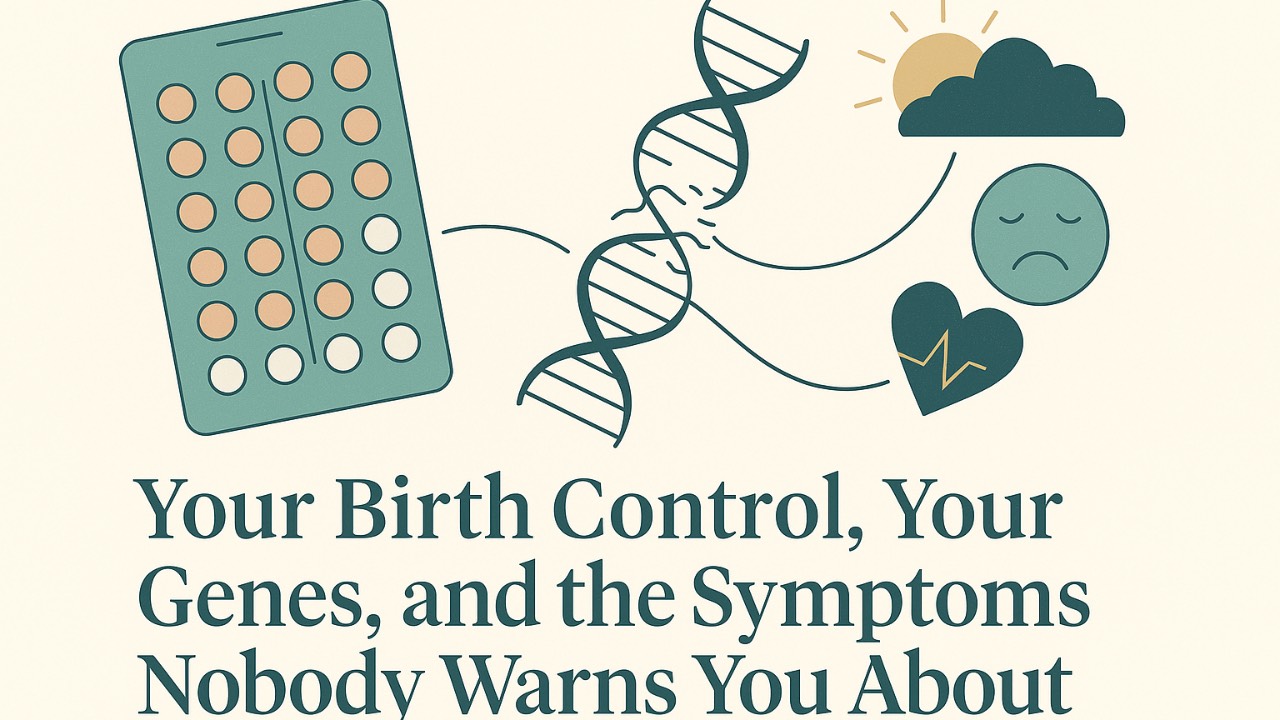Your Birth Control, Your Genes, and the Symptoms Nobody Warns You About
May 02, 2025
Nobody really tells you this upfront.
You sit down in the doctor’s office, maybe you are 18, maybe 28, maybe 38. You are handed a prescription for birth control like it is no big deal. You get a quick rundown of how to take it. Maybe a mention of nausea, maybe some vague talk about blood clots if you smoke. But that is about it.
What almost nobody talks about is what happens underneath the surface.
Slowly. Quietly.
Especially if your genes are wired in a way that struggles to keep up.
Because here is the thing. Synthetic hormones — even the low-dose ones — can put a lot of pressure on your body’s detox systems. And if you have certain genetic variants, like in COMT, CYP1B1, or PEMT, your system might not clear out that extra estrogen very efficiently.
At first, you might not even notice. Maybe a little fatigue. Maybe your moods feel a little off some days, but you chalk it up to stress.
Over time, though… it can build.
The Estrogen Traffic Jam
Your body is designed to process estrogen in a pretty elegant, multi-step way.
First, it modifies the hormone into a slightly less active form. Then it packages it up for removal, mostly through the liver and bile.
Simple. Clean. Efficient. At least, that is the plan.
But when genes like CYP1B1 are sluggish, that first step gets messy. Instead of neatly neutralizing estrogen, your body can start creating more reactive, inflammatory metabolites. Stuff that lingers a little longer than it should.
Stuff that the liver then has to scramble to deal with.
Enter COMT… another key player. COMT’s job is to mop up these leftover estrogens and other stimulants, making them water-soluble so you can excrete them. But if your COMT gene is slower (and a lot of people’s are), it is like having half as many janitors working a shift that just doubled in size.
It backs up. And eventually, it spills over into symptoms.
Fatigue you cannot explain.
Mood swings that seem to come out of nowhere.
Skin flares.
Water retention.
Brain fog.
Even feeling more reactive to stress, as if your fuse got shorter without you meaning for it to.
And all the while, the standard lab work might look “normal enough.”
Because most labs are not checking how well you are actually clearing estrogen… they are just measuring how much is floating around.
It is not the same thing. Not even close.
The Nutrient Drain Nobody Mentions
Then there is PEMT.
A gene most people have never even heard of, but one that quietly holds up the foundation of your detox pathways.
PEMT helps your body make phosphatidylcholine, which is critical for healthy bile flow.
No healthy bile flow, no easy exit for excess hormones. They just sort of… circulate. Recirculate. Over and over.
Birth control pills also tend to deplete nutrients like B vitamins, magnesium, and choline — the very building blocks your body would need to keep detoxification humming along.
It becomes this quiet spiral. The longer you are on it, the more your body leans on pathways that were already a little compromised to begin with.
And eventually, symptoms start surfacing that nobody connects back to the little pill you were handed so casually all those years ago.
What This Means If You Are Struggling Now
This is not about fear.
It is about perspective.
Some people take birth control and feel fine. Others start feeling a slow, steady erosion of energy, mood, or resilience. But because it is gradual, and because life is always busy, they do not immediately trace it back.
If you are someone who feels like their health started slipping somewhere along the way… it is okay to wonder if genetics could be part of the puzzle.
Maybe your COMT gene just needed a little more support than it got.
Maybe your PEMT pathway was already a little threadbare, and the extra load tipped it over.
Maybe your body has been working overtime to keep up with something it was never really built to process in large doses.
None of this means you made a mistake.
It just means there might be more layers to look at than you were ever told.
The First Step Toward Understanding
If you have been wondering why you feel different… why the fatigue will not lift, why your moods feel more unpredictable, why your body feels heavier or slower in ways you cannot explain. It might be time to look under the hood.
Genetic testing, like the Works Panel from MaxGen Labs, can give you a glimpse into how your detox pathways are wired.
It does not hand you all the answers, but it gives you a map. A starting point.
And if you already have results sitting in your inbox, half-understood, that is okay too.
Sorting through genetic data can feel overwhelming at first. It is not you. The way it is presented is rarely designed for real humans to actually make sense of.
If you ever want someone to sit with you, look at the results, and piece it together in a way that actually fits your story, I am happy to help.
We can set up a consultation and walk through it slowly.
Because sometimes, just seeing how it all connects… makes a difference you did not realize was possible.


